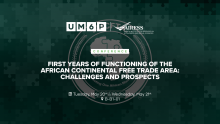Book Review III of The African Continental Free Trade Area Agreement: The Development of a Rules-Based Trading Order
While much has been written about the African Continental Free Trade Area (AfCFTA), very few studies address the social, political and cultural implications of this new regional bloc from the perspective of international economic law. In this respect, Professor Kufuor’s book pushes disciplinary boundaries and presents an original account of how markets have been constituted, expanded and reformulated across Africa. Kufuor draws on a range of theoretical lenses from international political economy, jurisprudence, history, sociology and economics to critically evaluate what institutional shifts will be required at different levels of governance if the aim of pan-African unification through a rules-based order is to materialise.
